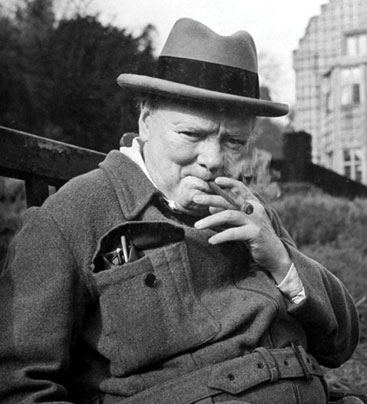CELEBRATING CHARTWELL’S SURVIVAL
As we continue to ponder (and celebrate) the miraculousness of reaching our 40th year of existence, intact, we cannot help but reflect on the many times that Winston Churchill very nearly lost his beloved home, Chartwell; our esteemed namesake. One such close call commenced 86 years ago this month.
 In February 1937, Winston Churchill revealed to his wife, Clementine, that he was considering an offer to sell Chartwell. “There is a lady,” he wrote to her in a letter, “nibbling around for a house like Chartwell, and even mentioning Chartwell. . . If I could see £25,000 I should close with it. If we do not get a good price we can quite well carry on for a year or two more. But no good offer should be refused . . . our children are almost all flown, and my life is probably in its closing decade.”
In February 1937, Winston Churchill revealed to his wife, Clementine, that he was considering an offer to sell Chartwell. “There is a lady,” he wrote to her in a letter, “nibbling around for a house like Chartwell, and even mentioning Chartwell. . . If I could see £25,000 I should close with it. If we do not get a good price we can quite well carry on for a year or two more. But no good offer should be refused . . . our children are almost all flown, and my life is probably in its closing decade.”
Fortunately, the market for Churchill’s magazine and newspaper articles was hugely expanded in 1937. Dr. Emery Revesz (later anglicized to Reves), the Hungarian-born founder of the Co-Operation Press Service for International Understanding — one of Europe’s top journalism syndicators — approached Churchill with an offer that he readily accepted: to place his writings in a remarkable range of newspaper outlets worldwide. Within six months, Reves sold Churchill’s work in twenty-six cities, from Prague and Warsaw, to Riga and Buenos Aires, bringing Churchill’s ringing alarms against Nazism and German militarism to a much wider readership, at a much increased revenue rate.
Churchill also published a new book in 1937, Great Contemporaries, a compendium of 21 penetrating profiles of political and literary luminaries drawn from earlier Churchill magazine and newspaper articles. An utter delight to read — beautifully written, brutally opinionated (Hitler came off just a bit better than George Bernard Shaw) — the book garnered a great many admirers, including, oddly enough, the new Conservative Prime Minister, who, while refusing Churchill any place in his government, nevertheless wrote to him from Downing Street: “How you can go on throwing off these sparkling sketches with such apparent ease & such sustained brilliance, in the midst of all your other occupations is a constant source of wonder to me. But the result is to give great pleasure and entertainment to your numerous admirers, of whom not the least sincere is, yours very gratefully, Neville Chamberlain.”
Still, Churchill found it impossible to keep up with his bills. In March 1938 a precipitous drop in the value of his American stock holdings left him with a sudden and altogether insurmountable £18,000 deficit. Clearly, he would not merely have to sell Chartwell (its placement on the market was announced on April 2 in The Times), but abandon politics altogether in order to write his way out of debt. Only the intervention of an old friend, the banker Sir Henry Strakosch, saved Churchill (and almost undoubtedly Britain and the Free World) from this calamity. Stepping in forcefully, Strakosch assumed Churchill’s stock positions while paying off Churchill’s stockbroker, Vickers da Costa, in full. A bullet was dodged.
We continue to wish you good health
and a perfect run of (figurative) bullets dodged.


